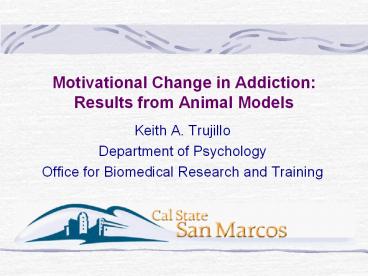Motivational Change in Addiction: Results from Animal Models - PowerPoint PPT Presentation
1 / 21
Title:
Motivational Change in Addiction: Results from Animal Models
Description:
Motivational Change in Addiction: Results from Animal Models Keith A. Trujillo Department of Psychology Office for Biomedical Research and Training – PowerPoint PPT presentation
Number of Views:94
Avg rating:3.0/5.0
Title: Motivational Change in Addiction: Results from Animal Models
1
Motivational Change in Addiction Results from
Animal Models
- Keith A. Trujillo
- Department of Psychology
- Office for Biomedical Research and Training
2
What do you think? Should we get started on that
motivational research, or not?
3
Animal Models and Clinical Research
- Animal Models
- Basic Science
- Clinical Research
- Therapy Development
- Health Services
4
Motivation and Addiction
- Acute Drug Effects
- reward
- Chronic Drug Effects
- plasticity/neuroadaptations
- tolerance
- physical dependence
- sensitization
- Is there evidence for motivational change in
animal models of addiction?
5
Reward and Addiction
- Reward mediated by specific neural circuits
- addictive drugs directly stimulate reward
circuits - reward transmitters dopamine, endogenous
opioids, serotonin, endocannabinoids
From NIDA
6
Reward and Addiction
- Reward does not explain addiction
- pleasurable effects cannot account for compulsive
drug seeking - majority of users do not become addicts
reward contributes to drug use reward ? addiction
7
Plasticity / Neuroadaptation
- Paradigm shift changes in response to chronic
drug use important to addiction - neuroadaptations contribute to addiction by
modifying motivational effects of drugs - modify positive and negative reinforcement
- tolerance
- physical dependence
- sensitization
8
Tolerance
- Decrease in an effect following chronic use
tolerance to the analgesic effect of morphine in
rats Peterson and Trujillo
- addicts may take increasing amounts of drug due
to decreases in desired effects or decreases in
side-effects
9
Tolerance and Addiction
- Tolerance does not explain addiction
- addiction can occur in absence of tolerance
- tolerance often seen in absence of addiction
- tolerance often follows, rather than precedes
addiction
tolerance contributes to drug use tolerance ?
addiction
10
Physical Dependence
- Change in functioning following chronic use
- further drug is needed to avoid withdrawal
syndrome
naloxone-precipitated morphine withdrawal in
rats Trujillo and Akil
- negative reinforcement addicts take drugs to
avoid withdrawal
11
Physical Dependence and Addiction
- Physical dependence does not explain addiction
- addiction can occur in absence of physical
dependence - physical dependence often occurs in absence of
addiction - symptoms dont explain intense desire for drug
- relapse in addicts often occurs long after
symptoms of withdrawal subside
physical dependence contributes to drug
use physical dependence ? addiction
12
Sensitization
- Increase in an effect following chronic use
sensitization to the locomotor stimulant
effect of morphine in rats Ruzek and Trujillo
- reward sensitization (increased liking)
- incentive-sensitization (increased wanting)
- may be responsible for craving
13
Sensitization and Addiction
- Does sensitization explain addiction?
- hypothesized that repeated drug use leads to
increased desire for drug - craving may develop via sensitization
- sensitization well-studied in animal models
- relevance to human addiction presently unclear
sensitization contributes to drug
use sensitization ? addiction?
14
Glutamate Involved in Neuroadapations
Sensitization
Tolerance
Physical Dependence
Trujillo and Akil Mendez and Trujillo
15
Glutamate Antagonists Slowly Reverse
Neuroadaptations
Peterson and Trujillo
16
Escalation in Self-Administration with Long-Access
- Ahmed Koob, Science (1998)
- long-access increases cocaine self-administration
(also heroin)
Long (6hr/day)
Short (1hr/day)
Effort
17
Addiction-Like Changes in Self-Administration
with Long-Access
- Deroche-Gamonet et al, Science (2004)
- Vanderschuren Everitt, Science (2004)
- long-term cocaine self-administration produces
motivational change (in some rats)
Resistance to Punishment
Persistence
Effort
18
Questions
- What motivational mechanisms are changed?
- positive reinforcement negative reinforcement
incentive salience, others? - What are the neural substrates of the changes?
- Can the changes be reversed?
19
Summary
- Reward important in drug abuse and addiction
- Plasticity/Neuroadaptation important in drug
abuse and addiction - Plasticity/Neuroadaptation is reversible
- Animal studies more closely modeling addiction
- motivational changes seen with long-term use
A better understanding of motivational changes in
addiction should lead to better treatment
20
Acknowledgements
- Graduate Students (former undergrads)
- Kathleen Warmoth
- Michelle Lewellen
- David Peterson
- Karen Watorski
- Dawn Albertson
- Ian Mendez
- Erik Ruzek
- Undergraduates
- Kate Kubota
- Angelica Runno
- Juan Zamora
- University of Michigan
- Huda Akil
- Grant Support
- NIDA (DA11803)
- NIGMS (GM59833)
- CSU San Marcos
21
positive reinforcement
negative reinforcement
reward
incentive salience
hedonic dysregulation
wanting
liking
pleasure
dysphoria
euphoria
hedonia
allostatic dysregulation
incentive sensitization
craving































